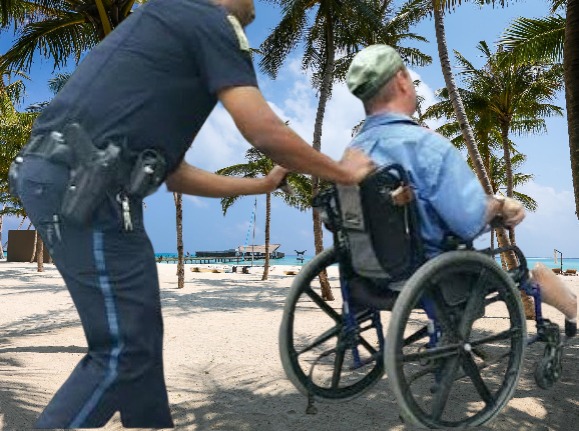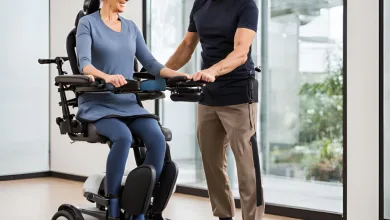Can You Get a DUI in a Wheelchair? Safety on the Move

Table of Contents
Can You Get a DUI in a Wheelchair? Safety on the Move
Navigating the Road: Can You Get a DUI in a Wheelchair?
Imagine cruising through the airport in your trusty wheelchair, excited for your next adventure. Suddenly, you see flashing lights. Can a police officer really pull you over for a DUI (Driving Under the Influence) in a wheelchair? The answer might surprise you!
This blog post dives into the world of wheelchair DUIs, exploring the laws surrounding motorized and non-motorized wheelchairs and offering essential safety tips for responsible mobility.
Can You Get a DUI in a Motorized Wheelchair?
Let’s talk about motorized wheelchairs, also known as electric wheelchairs. These powerful machines can zip through pedestrian areas like some traditional vehicles, and because of this, DUI laws often apply to them.
Here’s the key concept: DUI laws typically focus on operating a vehicle while impaired, not just a car. If you’re weaving through a crowded sidewalk on your motorized wheelchair while intoxicated, you could be a danger to yourself and others. This situation could lead to a DUI charge.
It’s All About Control
It’s important to remember that DUI laws are all about being in control of a vehicle. If you’re under the influence of alcohol or drugs to the point where you can’t safely operate your motorized wheelchair, you’re breaking the law. Think of it like riding a bike while intoxicated – it’s simply not safe.
State Variations
While the general principle of operating a vehicle under the influence applies to motorized wheelchairs in many places, specific DUI laws can vary by state. Some states explicitly mention motorized wheelchairs in their DUI statutes, while others don’t. It’s always a good idea to check your state’s laws to be on the safe side.
Can You Get a DUI in a Non-Motorized Wheelchair?
Non-motorized wheelchairs are propelled by the user’s arms or by a helper. Since they don’t have a motor, you might think a DUI wouldn’t apply. However, safety is still paramount.
Imagine a situation where you’re maneuvering a non-motorized wheelchair through a busy airport terminal while intoxicated. If your impaired judgment leads to an accident that harms yourself or others, you could face legal consequences, though not necessarily a DUI charge.
Public Safety Matters
Remember, the main goal is to keep everyone safe. If you’re under the influence and operating a non-motorized wheelchair in a way that creates a risk, you could face charges related to disorderly conduct or reckless endangerment.
Safety First: Essential Tips for Wheelchair Users
Whether you use a motorized or non-motorized wheelchair, safety should always be your top priority. Here are some essential tips to keep in mind:
- Plan Your Trips: If you know you’ll be consuming alcohol or drugs, arrange for alternative transportation back home or to your destination.
- Know Your Limits: Be aware of how alcohol or drugs affect you, and avoid operating your wheelchair if you’re impaired.
- Stay Alert: Even without intoxication, distractions like texting or using headphones can impede your ability to navigate safely.
- Ask for Help: If you’re feeling unwell or need a break, don’t be afraid to ask a friend, family member, or airport staff for assistance.
FAQs: Your Wheelchair and the Law
Q: Do all states have DUI laws for motorized wheelchairs?
A: No, DUI laws can vary by state. Some states explicitly mention motorized wheelchairs, while others don’t. It’s always best to check your state’s specific rules.
Q: Can I get in trouble for using a non-motorized wheelchair while intoxicated?
A: While a DUI wouldn’t likely apply, you could face charges related to public safety if your impaired state causes an accident or disrupts public order.
Q: What should I do if I’m pulled over by a police officer while using my wheelchair?
A: Stay calm and polite. Respond to the officer’s questions clearly and honestly. If you feel uncomfortable, politely request to speak with a lawyer.
Conclusion: Enjoying Your Independence Safely
Understanding the legalities surrounding wheelchair DUIs and prioritizing safety empowers you to navigate the world with confidence and independence. By planning your trips, knowing your limits, and staying alert, you can ensure a smooth and enjoyable journey. Remember, whether you use a motorized or non-motorized wheelchair, safety comes first. Don’t hesitate to ask for help when needed. With a bit of preparation and a focus on responsible mobility, you can explore new places and embrace all the adventures life has to offer!
This conclusion reiterates the main takeaways:
- Understanding the law: Knowing the potential legal consequences of operating a wheelchair while intoxicated is crucial.
- Prioritizing safety: The blog post emphasizes that safety is paramount, regardless of the wheelchair type.
- Maintaining Independence: By following the safety tips, wheelchair users can maintain their independence and enjoy travel.
You may get some other relevant resources from the following sites
National Highway Traffic Safety Administration (NHTSA): The NHTSA website provides a wealth of information on traffic safety laws and regulations. While it doesn’t have a specific section on wheelchair DUIs, it offers resources on general DUI laws (https://www.nhtsa.gov/)
FindLaw: This legal information website has an article titled “Yes, You Can Get a DUI in a Wheelchair” that discusses the concept of DUI laws applying to motorized wheelchairs (https://www.ajc.com/news/crime–law/georgia-man-gets-dui-motorized-wheelchair/CmA1YLKtbBSUQbaMBuqWTK/)
Your State’s Department of Motor Vehicles (DMV) Website: Most state DMVs have websites that outline DUI laws and regulations specific to that state. Searching for “DUI laws” on your state’s DMV website can provide the most up-to-date information for your location.



